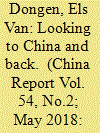| Srl | Item |
| 1 |
ID:
159344


|
|
|
|
|
| Summary/Abstract |
Against the background of the rise of ‘diaspora institutions’ since the early 2000s, this commentary reflects on China’s diaspora engagement and India’s interest in it in the context of its own institutionalisation of diaspora engagement since the early 2000s. It argues that notwithstanding historical and political differences, some lessons could be learned from China. These pertain to the importance of recognising the various segments of the diaspora; the role of community organisations; the centrality of diaspora research; and the connection between diaspora policies and shifting national priorities. However, both in China and in India, some principal limits remain in terms of diaspora engagement due to the prioritising of the socio-economically advantaged; the tension among cultural, ethnic and territorial understandings of the nation; and because political inclusion lags behind the focus on economic and knowledge contributions. These limits lead us to reconsider some of the shared ideas, assumptions and practices behind the rise of ‘diaspora institutions’ in a broader sense.
|
|
|
|
|
|
|
|
|
|
|
|
|
|
|
|
| 2 |
ID:
188179


|
|
|
|
|
| Summary/Abstract |
While many states directly engage their non-resident populations to rally support for domestic political agendas, extract remittances, or to further foreign policy objectives, few countries have been more active in this space than Turkey under the Justice and Development Party (AKP). By the early 2020s, researchers and scholars had obtained a fairly good understanding of the ways in which the Turkish government seeks to (selectively) engage or cooperate with, but also to suppress some members of what it perceives as its diaspora. These efforts are specified in official diaspora engagement policies and implemented through, for instance, governmental institutions like the ‘Presidency for Turks Abroad and Related Communities’ (YTB), or cultural institutions like the ‘Yunus Emre Institutes.’ However, even though scholars have learned a fair bit about the supply side of Turkish diaspora engagement, we know comparatively little about the demand side of and for such efforts. To begin filling this gap, this article switches perspectives from the supplier to the consumer/recipient and seeks to understand better the ways in which diasporans perceive, relate to, and engage with such efforts. By building on primary and secondary sources as well as semi-structured interviews with members of the Turkish diaspora in Sweden, this article seeks to contribute to an understanding of the varied ways in which diasporans relate and react to different forms of state-led diaspora engagement.
|
|
|
|
|
|
|
|
|
|
|
|
|
|
|
|